Coronavirus: Living lockdown in an empty four-star hotel
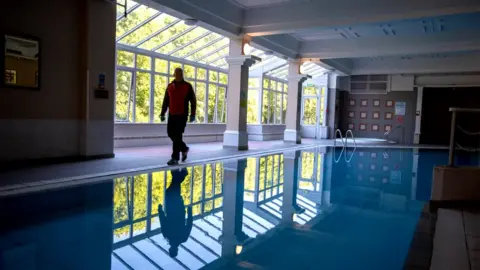 Tom Banks
Tom BanksDurham's Royal County hotel stayed open through two World Wars - but when the coronavirus shut its historic front doors in March, maintenance manager Will Whelan moved in to help prepare for a new normal.
Guests are long gone and bookings suspended for the foreseeable future. But four times a day, Will Whelan checks the water quality in the Royal County hotel pool. It's all about ensuring the right balance of chemicals for when, at some point in the future, the next person dips their toe.
It's anyone's guess as to when that might be. Across the country, most of the UK's 10,000 hotels are standing empty. Though some stayed open for key workers and the homeless, the majority were mothballed during the frantic two weeks in the middle of March when many parts of British life came to a halt due to the lockdown.
With its 100 other staff furloughed, Will, 56, is one of eight maintenance staff keeping the Grade II listed hotel in the heart of Durham alive. At the height of the lockdown, he even moved into one of its 150 four-star rooms. "I've stayed over before," he says. "But not like this."
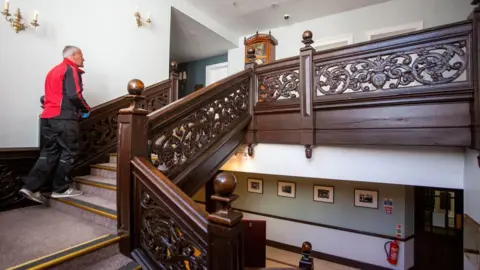 Tom Banks
Tom Banks"To be isolated here for some people would be a blessing. When I first was locked down and staying in the hotel full time it was all sort of a bit exciting, like anyone who goes to a hotel," he says.
Will and a colleague used furniture from the banqueting hall to play table tennis and he moved an exercise bike from the hotel gym to workout beside reception. But it soon wore thin.
"It's spooky. It's not quite The Shining, it's more like Home Alone. You can scream as loud as you like, no one is going to hear you," he says.
"Really what you want is to be around other people. As nice as the beds are, and the showers and the tellies and the fluffy towels and the robes and the complimentary slippers, you can only have so much."
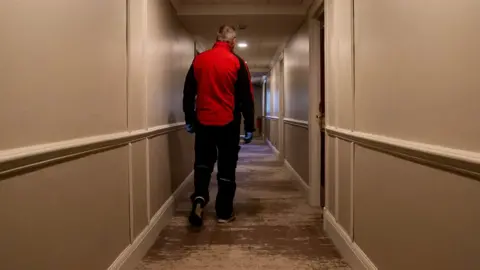 Tom Banks
Tom BanksHotels everywhere have had to grapple with the task of keeping buildings safe even as revenue stopped practically overnight. Marriott, the global giant which owns the Royal County, has around 650 staff still working across its 60 managed hotels in the UK.
Simple things like keeping water running through pipes becomes a Herculean effort when guests aren't there to take showers or brush their teeth.
It's why once a week, Will has to turn each of the Royal County's 600 taps on for five minutes to release standing water. It could easily take up a day of his time, but prevents bacteria that can cause the lethal Legionnaires' disease from building up.
The hotel's 170 toilets need to be flushed twice a week and shower heads need sanitising and hoses replacing. The ice machines are cleaned, every drawer is left open and rooms kept at precisely 16C to prevent mould, their thick blackout curtains tightly closed.
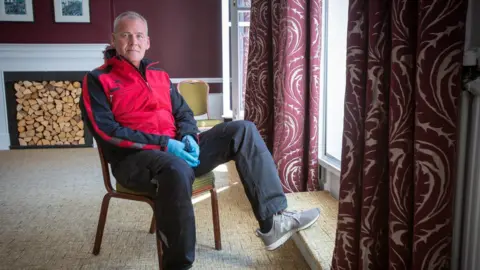 Tom Banks
Tom BanksThe UK's hotel industry, worth over £20bn in 2018, together with the wider hospitality sector, has so far borne the brunt of the coronavirus. Almost 90% of staff in the sector have been furloughed, according to industry body UK Hospitality, equal to 2.7m people - more than any other.
Over a third of accommodation and food businesses think it will be more than four weeks before they reopen, according to a recent Office for National Statistics survey. The same study showed 60% of hospitality companies that are still trading have reduced working hours.
Industry leaders are calling on the government to confirm reopening can begin on 4 July - the next date for the potential further easing of lockdown restrictions. They say this will safeguard jobs as the tapering of the furlough scheme nears.
"If we don't get that confirmation then there is a very real concern that we'll see job losses in August because these businesses cannot afford to pay anything towards it," says Kate Nicholls, the chief executive of UK Hospitality.
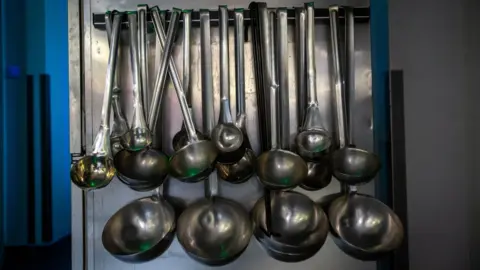 Tom Banks
Tom BanksOne of the biggest problems for hotels, guest houses and holiday parks, is providing enough notice for guests to begin booking again. In Northern Ireland, businesses have been told they can definitely accept bookings from 20 July - though they may open sooner.
It's the sort of message Ms Nicholls wants to hear from the UK government at Westminster. "We need to give consumers certainty that they can book their hotel break from a given date," she says.
The 2m rule for social distancing could also cut vital revenue for hotels by reducing the capacity of food and beverage outlets.
Another headwind for the sector is the government's plan to impose a 14-day quarantine for arrivals into the UK from Monday. Marriott, which attracts foreign travellers to its UK hotels through its worldwide loyalty scheme, describes the policy as "another blow" to the industry.
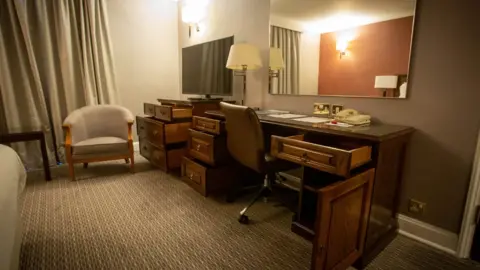 Tom Banks
Tom BanksAnd Ms Nicholls fears the quarantine will have an even longer lasting effect by sending the message that "Britain is closed". "That lasts not just the three weeks, six weeks, however long quarantine is in force, but will have a longer lasting impact right the way through the rest of this year."
But back in County Durham, Will is optimistic the Royal County's lobby will be filled with a buzz one day soon.
"People will always travel," he says, "I just want to make sure when that day comes, people walk in and it has that wow factor."
Picture editor: Emma Lynch.
